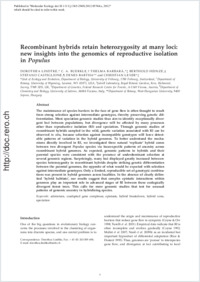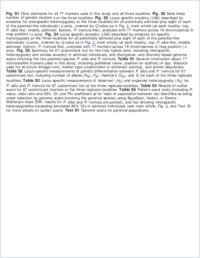Recombinant hybrids retain heterozygosity at many loci: new insights into the genomics of reproductive isolation in Populus
- Lindtke, Dorothea Unit of Ecology and Evolution, Department of Biology, University of Fribourg, Switzerland
- Buerkle, C. Alex Department of Botany, University of Wyoming, Laramie, USA
- Barbará, Thelma Unit of Ecology and Evolution, Department of Biology, University of Fribourg, Switzerland - Jodrell Laboratory, Royal Botanic Gardens, Kew, Richmond, Surrey, UK
- Heinze, Berthold Department of Genetics, Federal Research Centre for Forests, Vienna, Austria
- Castiglione, Stefano Department of Chemistry and Biology, University of Salerno, Fisciano, Italy
- Bartha, Denes Department of Botany, West Hungarian University, Sopron, Hungary
- Lexer, Christian Unit of Ecology and Evolution, Department of Biology, University of Fribourg, Switzerland - Jodrell Laboratory, Royal Botanic Gardens, Kew, Richmond, Surrey, UK
-
18.09.2012
Published in:
- Molecular Ecology. - 2012, vol. 21, no. 20, p. 5042-5058
English
The maintenance of species barriers in the face of gene flow is often thought to result from strong selection against intermediate genotypes, thereby preserving genetic differentiation. Most speciation genomic studies thus aim to identify exceptionally divergent loci between populations, but divergence will be affected by many processes other than reproductive isolation (RI) and speciation. Through genomic studies of recombinant hybrids sampled in the wild, genetic variation associated with RI can be observed in situ, because selection against incompatible genotypes will leave detectable patterns of variation in the hybrid genomes. To better understand the mechanisms directly involved in RI, we investigated three natural ‘replicate’ hybrid zones between two divergent Populus species via locus-specific patterns of ancestry across recombinant hybrid genomes. As expected, genomic patterns in hybrids and their parental species were consistent with the presence of underdominant selection at several genomic regions. Surprisingly, many loci displayed greatly increased between-species heterozygosity in recombinant hybrids despite striking genetic differentiation between the parental genomes, the opposite of what would be expected with selection against intermediate genotypes. Only a limited, reproducible set of genotypic combinations was present in hybrid genomes across localities. In the absence of clearly delimited ‘hybrid habitats’, our results suggest that complex epistatic interactions within genomes play an important role in advanced stages of RI between these ecologically divergent forest trees. This calls for more genomic studies that test for unusual patterns of genomic ancestry in hybridizing species.
- Faculty
- Faculté des sciences et de médecine
- Department
- Département de Biologie
- Language
-
- English
- Classification
- Biological sciences
- License
-
License undefined
- Identifiers
-
- RERO DOC 30456
- DOI 10.1111/j.1365-294X.2012.05744.x
- Persistent URL
- https://folia.unifr.ch/unifr/documents/302720
Other files
Statistics
Document views: 123
File downloads:
- pdf: 230
- Supplementary material: 184

